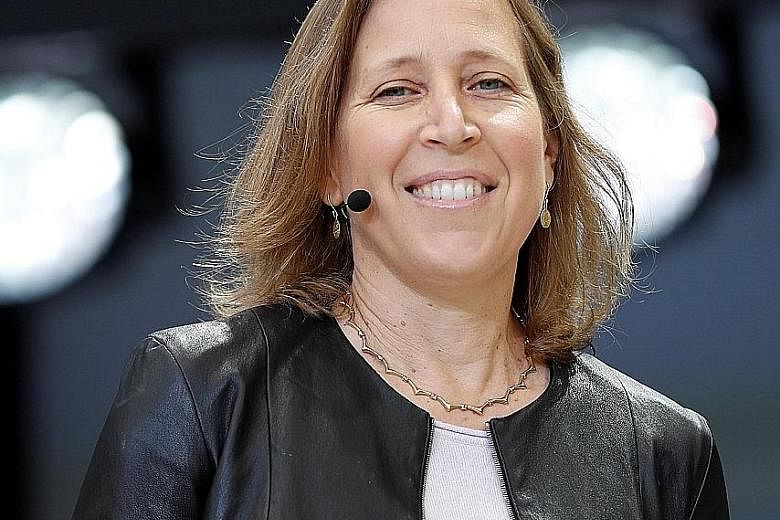SAN FRANCISCO • Like many Google leaders, Ms Susan Wojcicki probably faced some difficult questions from employees last week about the controversial employee memo that exploded on social media. But the most personal question may have come from her daughter.
In an essay published by Fortune last Wednesday, the chief executive of YouTube, owned by Google, wrote that her daughter asked her about the memo, which raised questions about Google's diversity efforts and included statements about gender differences.
It was written by a Google software engineer who was fired early last week in its aftermath.
"Mum," her daughter asked her, "is it true that there are biological reasons why there are fewer women in tech and leadership?"
Before revealing how she answered her daughter, Ms Wojcicki said the question has been "pervasive", based on her experience. "That question, whether it has been asked outright, whispered quietly, or simply lingered in the back of someone's mind, has weighed heavily on me throughout my career in technology."
She wrote that she has had her abilities and job commitment questioned, been left out of industry events and social gatherings, watched as outside leaders addressed her more junior colleagues in meetings and been interrupted and ignored.
"No matter how often this all happened, it still hurt," she wrote.
In the controversial memo, the Google software engineer had suggested that the gender pay gap stemmed from "biological causes" between men and women.
Ms Wojcicki continued: "(As a result) I thought about the women at Google who are now facing a very public discussion about their abilities, sparked by one of their own co-workers...
"And as my child asked me the question I had long sought to overcome in my own life, I thought about how tragic it was that this unfounded bias was now being exposed to a new generation."
Ms Wojcicki also directly addressed the engineer's dismissal.
"As a company that has long supported free expression, Google obviously stands by the right that employees have to voice, publish or tweet their opinions," she wrote. "But while people may have a right to express their beliefs in public, that does not mean companies cannot take action when women are subjected to comments that perpetuate negative stereotypes about them based on their gender."
She also raised the question of what if the word "women" in the memo had been replaced with another group - such as black, Hispanic or LGBTQ (lesbian, gay, bisexual, transgender and questioning) employees. "Would some people still be discussing the merit of the memo's arguments or would there be a universal call for swift action against its author?"
In writing the essay, Ms Wojcicki becomes one of the highest-ranking women at Google to address the matter publicly, adding a key female executive's voice to the company leadership's response.
While Ms Danielle Brown, Google's vice-president of diversity, integrity and governance, released a statement last week about the memo's "incorrect assumptions about gender", Ms Wojcicki's was much more personal.
After thinking about all these issues, she wrote: "I looked at my daughter and answered simply, 'No, it's not true'. "
The author of the memo, which was first circulated internally and then went viral online, wrote that "differences in distributions of traits between men and women may in part explain why we don't have 50 per cent representation of women in tech and leadership".
He wrote that women on average have "higher anxiety, lower stress tolerance", and "look for more work-life balance".
In a memo sent late last Monday to employees, Google CEO Sundar Pichai wrote that portions of the memo violated its code of conduct and "crossed the line by advancing harmful gender stereotypes" in the workplace.
WASHINGTON POST

